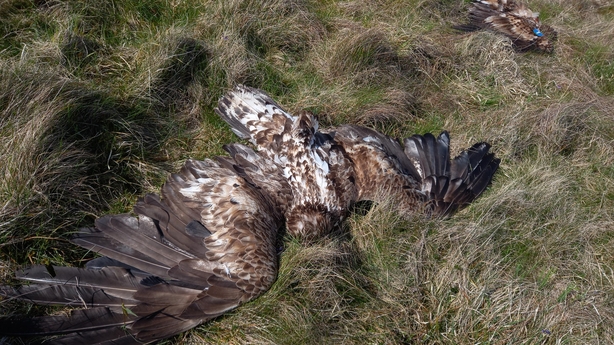A reward of £5,000 (€5,864) has been offered for information following the poisoning of two white-tailed eagles in Co Antrim.
The birds were found in the Glenhead Road area of Ballymena on 15 May.
A post-mortem examination revealed both birds tested positive for the insecticide bendiocarb.
The PSNI is investigating how they came in contact with the insecticide.
Tánaiste Micheál Martin expressed dismay at the poisoning.
The alarm was raised when conservationists monitoring one of the birds, which was released by Mr Martin on the Shannon Estuary last August and was fitted with a satellite tag, became concerned when the tag's data indicated it had stopped moving.
Mr Martin said he is "deeply saddened and shocked".
"I have closely followed the reintroduction programme for a number of years and to be involved in the release of the seven young eagles in 2022 was an experience that I will never forget," he said.
"These are an iconic species, and the work of the NPWS (National Parks and Wildlife Service) in reintroducing them is something I, and the Government, am proud to support.
"There have been great successes in the programme over recent years, so to learn of a poisoning like this is very disappointing."
The Royal Society for the Protection of Birds (RSPB) has offered a reward of £5,000 for information leading to the prosecution of those involved in the poisoning.
Rural and Wildlife Crime Superintendent Johnston McDowell said the illegal killing of the "majestic birds" is "disgraceful".
"The test results suggest that an individual not only has access to the insecticide bendiocarb but has placed this in to the outside environment illegally, so that wild birds have been able to consume it," he said.

"Bendiocarb is present in the trade product Ficam D, a powder which is only permitted for indoor use to control crawling insects such as wasps and ants, so using this active ingredient in fields would be a breach of Biocidal Products Regulation (BPR).
"The illegal killing of these beautiful birds in a popular rural area is disgraceful, and for any individual to think that they can ignore the law and lay poisonous bait which has led to the killing of these birds, is unacceptable and will not be tolerated."
He said officers, with support from the National Wildlife Crime Unit, have been on the ground conducting house-to-house inquiries in the areas where the birds were seen before they were found dead.
"The Police Service of Northern Ireland will continue to work with our partners to tackle this criminal activity, investigate any reports made to us and prosecute offenders," he added.

